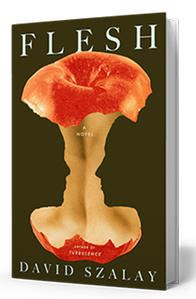Flesh by David Szalay has won the £50,000 (about $65,870) 2025 Booker Prize, honoring "the best sustained work of fiction written in English and published in the U.K. and Ireland."
 Szalay was born in Canada to a Hungarian father and Canadian mother. He has lived in Lebanon, the U.K., Hungary, and now Vienna. He is the author of six works of fiction that have been translated into more than 20 languages, as well as several BBC radio dramas. His All That Man Is was shortlisted for the Booker Prize in 2016.
Szalay was born in Canada to a Hungarian father and Canadian mother. He has lived in Lebanon, the U.K., Hungary, and now Vienna. He is the author of six works of fiction that have been translated into more than 20 languages, as well as several BBC radio dramas. His All That Man Is was shortlisted for the Booker Prize in 2016.
Flesh was published in the U.S. by Scribner in April and was the focus of a Shelf Awareness Maximum Shelf on October 23, 2024. We wrote in part that the book is the story of "István, the Hungarian teenager whose serendipity brings him to the heights of wealth and power, only for tragedy to complicate his path... Flesh [is] a brilliant novel that is as much about the immigrant experience as it is a cautionary tale about capitalism and the allure of eros.... Astute readers of literary fiction who enjoy thoughtful stories, stripped-down prose, unpredictable turns, and a counterpoint to traditional narratives about the immigrant experience will find much to savor in Flesh."
Organizers said, "Written in spare prose, and spanning decades--from a Hungarian housing estate to the mansions of London's rich elite--Flesh is a propulsive novel centred on an emotionally detached man who is unravelled by a series of events beyond his grasp."
Chair of judges Roddy Doyle, who won the Booker in 1993 and is the first Booker winner to chair a Booker judging panel, said, "The judges discussed the six books on the shortlist for more than five hours. The book we kept coming back to, the one that stood out from the other great novels, was Flesh--because of its singularity. We had never read anything quite like it. It is, in many ways, a dark book but it is a joy to read.
"At the end of the novel, we don't know what the protagonist, István, looks like but this never feels like a lack; quite the opposite. Somehow, it's the absence of words--or the absence of István's words--that allow us to know István. Early in the book, we know that he cries because the person he's with tells him not to; later in life, we know he's balding because he envies another man's hair; we know he grieves because, for several pages, there are no words at all.
"I don't think I've read a novel that uses the white space on the page so well. It's as if the author, David Szalay, is inviting the reader to fill the space, to observe--almost to create--the character with him. The writing is spare and that is its great strength. Every word matters; the spaces between the words matter. The book is about living, and the strangeness of living and, as we read, as we turn the pages, we're glad we're alive and reading--experiencing--this extraordinary, singular novel."

